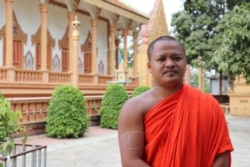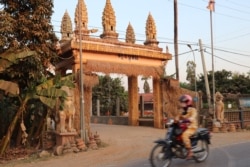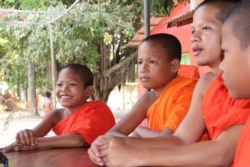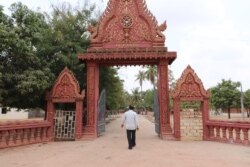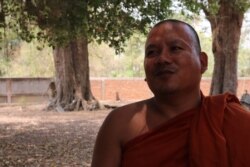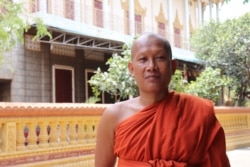PHNOM PENH —The period before Khmer New Year in mid-April is traditionally a busy time for monks. Chanting at numerous ceremonies across the districts, they receive donations for their blessings, and villagers from surrounding areas bring food to the pagoda to honor their Buddhist faith.
But this year is different.
Having noticed a significant drop in offerings in the two weeks leading up to Khmer New Year, the monks at Chumpouvaon Pagoda in Kandal’s Sa’ang district - about 35 kilometers south of Phnom Penh – worry things will get tough for them.
Venerable Dean Det, 25, became a monk with his younger brother nine years ago. This year, he said, the fear of the coronavirus kept people from coming.
“Since the start of COVID-19, fewer people have come to the pagoda,” he told VOA earlier this month. “It used to be 50 to 60 people [on those days], [now it] dropped to 10 to 20 people, so there's a shortage of food for monks.”
While the population struggles to sustain an income amidst the coronavirus pandemic and many Cambodians are worried about feeding their own families, monks in Cambodia are left behind as not enough donations come in.
Venerable Dean Det said they need at least $25 per day to feed the 31 monks living at Chumpouvaon Pagoda.
Khmer New Year officially starts Tuesday and ends Thursday this year, although the government has cancelled the holidays in an effort to prevent people from returning to their families in the provinces and contain the spread of the virus.
There are 120 official COVID-19 cases in the country, although doubts have been voiced about the accuracy of that number.
Tens of thousands of factory workers across the country are out of jobs after clothing companies, facing plummeting demand, have cancelled orders. The tourism sector, which accounts for almost 20 percent of Cambodia’s economy, is in tatters, as travel restrictions and fears about contagion see flights cancelled across the globe.
In normal times, the Buddhist clergy raises donations during religious events, such as during weddings or funerals. Now, they say, many have been cancelled, and the government has banned mass gatherings to celebrate the New Year.
With social distancing becoming increasingly respected across the country, the monks’ daily ritual of door-to-door alms-collection has also largely come to a halt since February to prevent catching the virus, Venerable Dean Det said.
To prevent the spread of the virus, the World Health Organization recommends so-called “social distancing”, namely to remain physically distant from others as much as possible.
Owing to growing desperation, however, monks sometimes still go out to collect alms and small amounts of food, such as sugar and noodles, he said.
And the situation might become direr after Khmer New Year, when alms and food donations drop even further and the monks do not have their New-Year-supplies to live off.
They are not the only ones potentially facing hunger. In Cambodia, there are more than 60,000 monks who depend on alms, according to secretary of state at the Ministry of Cult and Religion Nhean Phoeun.
Seng Sary, an independent social researcher who stayed at a pagoda for more than a year in the 1990’s, said that the virus had impacted the monks’ supplies.
“When the Buddhist population has financial issues, the monks at pagodas have financial issues as well,” he said. “The monks rely on the income from laymen, so when they lose income, the monks face financial issues.”
Touch Tun, 43, an assistant to venerable Dean Det at Chumpouvaon pagoda who has been running errands for him for more than five years, said he is worried about the shortage of food monks are facing if the outbreak prolongs.
Sary echoed similar sentiments, and said the situation could become much more difficult if the pandemic continued for too long.
“If the COVID-19 pandemic continues only for a brief period, the Buddhists still have the ability to support the pagoda. They won’t let the monks starve. But if it continues for a long time, there will be an issue of alms, not enough alms,” Sary said.
It would then fall on the monks’ relatives of those in the monkhood to offer support, he said.
But this is problematic, as many families send their children to study and live at pagodas because they lack the means to support them otherwise.
This seems to be the case for most monks at Chumpouvaon Pagoda. “All monks here are poor children who become monks. The monk chief and I came from poor families, from peasant families,” Venerable Dean Det said.
At the pagoda, about half of the monks are younger than 15 years old.
Ou Virak, director of Cambodian think-tank Future Forum, said the monks could be indirectly affected as thousands of workers in the informal economy, for example tuk tuk drivers and construction workers, were particularly vulnerable to the pandemic.
As they have no regular income, they will struggle to support themselves and their families in the countryside, he said.
About 40 kilometers north of Phnom Penh, monks at Kraing Sovann pagoda also face a declining number of worshippers in Kampong Speu province's Oudong district.
Monks at the pagoda say they’ve seen a 45 percent drop in the number of people coming to their pagoda compared to the same period last year.
“Before Khmer New Year, people usually give alms to many monks, but this year we miss that - because of the instructions from above not allowing big gatherings as they are worried about the possibility of infection,” said chief monk Vann Chantha.
Nhean Phoeun, secretary of state with the Ministry of Cult and Religion, told VOA last week that the government had to be cautious to prevent the spread of the virus and had instructed people to avoid mass gatherings - and this, he said, included monks.
Chief monk Chantha, 39, said that aside from not receiving enough donations, the virus affected the monks on a spiritual level as they were unable to properly celebrate one of Cambodia’s biggest national holidays.
“For monks, Khmer New Year means celebrating the kindness of the Buddhists,” he said.
The government this week also restricted travel between provinces in an effort to stop the spread of COVID-19, effectively blocking many reunions.
This also has a spiritual effect on devout Buddhists, as the travel ban will prevent people from making offerings to their deceased parents. While the main occasion to make offerings to ancestors is later in the year -- during Pchum Ben -- it is also an important tradition at this time of the year.
Man Deap, 40, is a devout Buddhist living close to Kraing Sovann Pagoda where her 13-year-old son has been a monk for the past two years.
She said her deceased parents would be in want of food if she didn’t offer them food, but that not everyone was able to do so this year.
“The devout buddhists who live near the pagoda will come during Khmer New Year,” she said. “But those who are far away, they are afraid to come.”
Deap knows that the pagodas depend on her and the other villagers.
“We are near here. If we don’t come, the monks would have nothing to eat,” she said.
However, not every pagoda is affected by the outbreak.
In the country’s capital, for example, Sarin Samnang has been living at Sampov Meas Pagoda for more than five years.
The 40-year old monk, who has been a monk for 20 years and is also a university student, said his pagoda had received a steady supply of food and had not seen a drop because of the pandemic like others had.
At the Sampov Meas pagoda, devotees take turns supplying food to the more than 70 monks.
“I don’t have to go out to collect alms because at this pagoda there is daily and monthly supply – month after month, year after year,” he said.
Those less lucky can only wait for the pandemic to be over. Venerable Dean Det hopes that Buddhists will help the monks during these difficult times.
“The new year is near,” he said. “The alms might be rare, because … many, many Buddhists are scared of the widespread coronavirus. So maybe this New Year, not many will come.”





